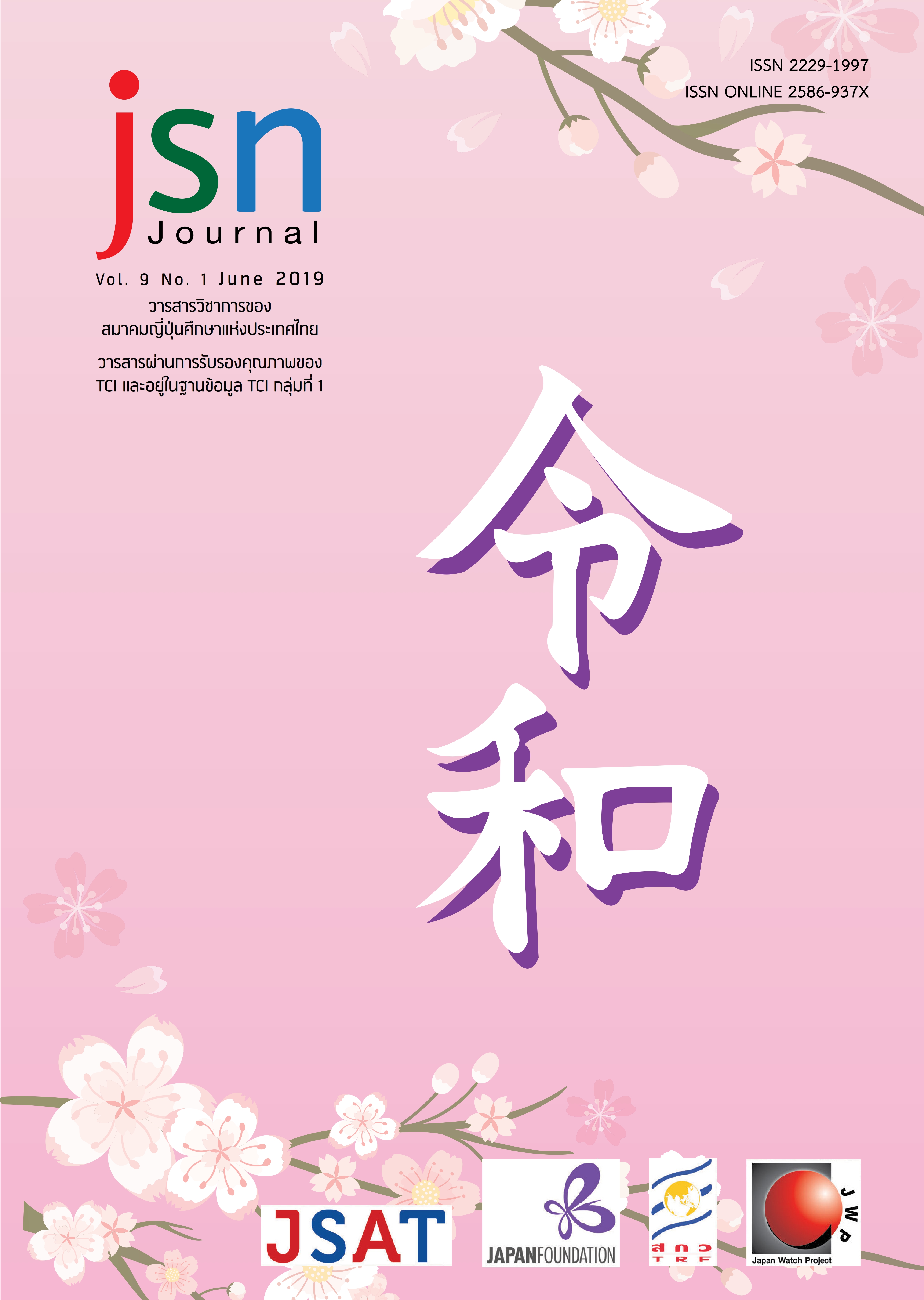New Approaches to Language Education: Utilizing Online Resources to Teach Japanese Pronunciation
Main Article Content
Abstract
In this paper, new approaches to language education are suggested in order to solve problems involved in traditional face-to-face instruction. I will first introduce three online resources that I have developed, all of which are available to all learners and instructors of Japanese around the world at no charge. Then I will discuss the course that I have designed using a ‘blended learning’ style, combining these three online resources. Finally, I will make suggestions on teaching/learning Japanese pronunciation for Thai learners of Japanese.
Article Details
ข้อความและข้อคิดเห็นต่างๆ ในบทความเป็นของผู้เขียนบทความนั้นๆ ไม่ใช่ความเห็นของกองบรรณาธิการหรือของวารสาร jsn Journal
References
Asadayuth, C. (2017). Learning Japanese Pronunciation by MOOCs for Thai Learners in New Era. Waseda Studies in Japanese Language Education, 23, 63-71. (in Japanese).
Clayton Christensen Institute (2019, April 7). Blended Learning. Retrieved from https://www.christenseninstitute.org/blended-learning/.
Dewey, J. (1944). Democracy and Education. NY: Macmillan Company.
Dickinson, L. (1987). Self-instruction in Language Learning. Cambridge: Cambridge University Press.
Dickinson, L. (1995). Autonomy and Motivation: A Literature Review. System, 23(2), 165-174.
Ginns, P. & Ellis, R. (2007). Quality in Blended Learning: Exploring the Relationships between On-line and Face-to-face Teaching and Learning. The Internet and Higher Education 10 (1), 53-64.
Horn, B. M. & Staker, H. (2014). Blended: Using Disruptive Innovation to Improve Schools.CA: Jossey-Bass.
McIntyre, C. (2019, May 1). How Employers View MOOC Certificates in 2018. Retrieved from https://www.linkedin.com/pulse/how-employers-view-mooc-certificates-2018-carolyn-mcintyre/.
Methapisit, T. (2014). Current Status and Issues concerning Japanese Pronunciation Teaching for Thai Learners of Japanese: Focus on Teachers’ Practices and Learners’ Awareness.Waseda Studies in Japanese Language Education, 14-15-16, 87-104. (in Japanese).
Toda, T. (2004). Japanese Pronunciation Exercises for Communication. Tokyo: 3A Corporation (in Japanese).
Toda, T. (2012). The Critical Period Hypothesis and Phonological Acquisition of Japanese. Quantitative Approaches to Problems in Linguistic. LINCOM Studies in Phonetics, 123-131.
Toda, T. (2017). Online Japanese Pronunciation Course in Global MOOCs: Interpretation of Course Evaluation Results. Waseda Studies in Japanese Language Education, 23, 1-20. (in Japanese).
Toda, T. (in press). Blended Learning: Construction of a New Model and Educational Practice of Pronunciation. Waseda Studies in Japanese Language Education, 26. (in Japanese).
Toda, T. (ed.) (2008). Japanese Language Education and Speech Communication. Tokyo: Kuroshio Publishers (in Japanese).
Toda, T., Okubo M., Kamiyama Y., Konishi, R. & Fukui, K. (2012). Japanese Pronunciation Practice through Shadowing. Tokyo: 3A Corporation (in Japanese).
Toda, T., Okubo M., Chun S. & Zhao B. (2018). Continued Participation in Mutual Evaluation of Global MOOCs: Analysis of a Japanese Pronunciation Online Course. Journal of Japanese Language Teaching, 170, 32-45. (in Japanese).
Toda, T. & Odo, Y. (2018). The State of Video Replay Logs for Japanese Online Course in Global MOOCs, Paper presented at the Conference of the Society for Teaching Japanese as a Foreign Language. Tokyo University of Foreign Studies, 27 May 2018 (in Japanese).
Toda, T., Odo, Y. & Takeuchi, Y. (in press). Ingenuities of Feedback in “Pronunciation Check”: Approaches towards Rapport Building in Online Education. Waseda Studies in Japanese Language Education, 26. (in Japanese).


